Support strong Canadian climate journalism for 2025
On his way to becoming prime minister, Justin Trudeau famously said, "There is not a country in the world that would find billions of barrels of oil and leave it in the ground."
On Tuesday, he followed through.
Prime Minister Trudeau approved two giant new bitumen pipelines at once -- Kinder Morgan's tripling of Trans Mountain and Enbridge's doubling of Line 3. Combined they will allow an additional 200 million tonnes of climate pollution (MtCO2) to come out of Alberta's soil every year. That exceeds the combined annual emissions from 100 nations.
These projects are designed to pump 10 billion tonnes of climate pollution over their fifty year life spans.
Trudeau called it a "major win."
He even repeated the declaration that no country would leave oil in the ground, so long as "there is a market for it."
This our Prime Minister's latest step in his bewildering climate dance. One step forward with a new climate policy. Two steps back with an expansion in climate pollution that wipes them out. Repeat until dizzy and disoriented.
Updating Trudeau's CO2 Scorecard
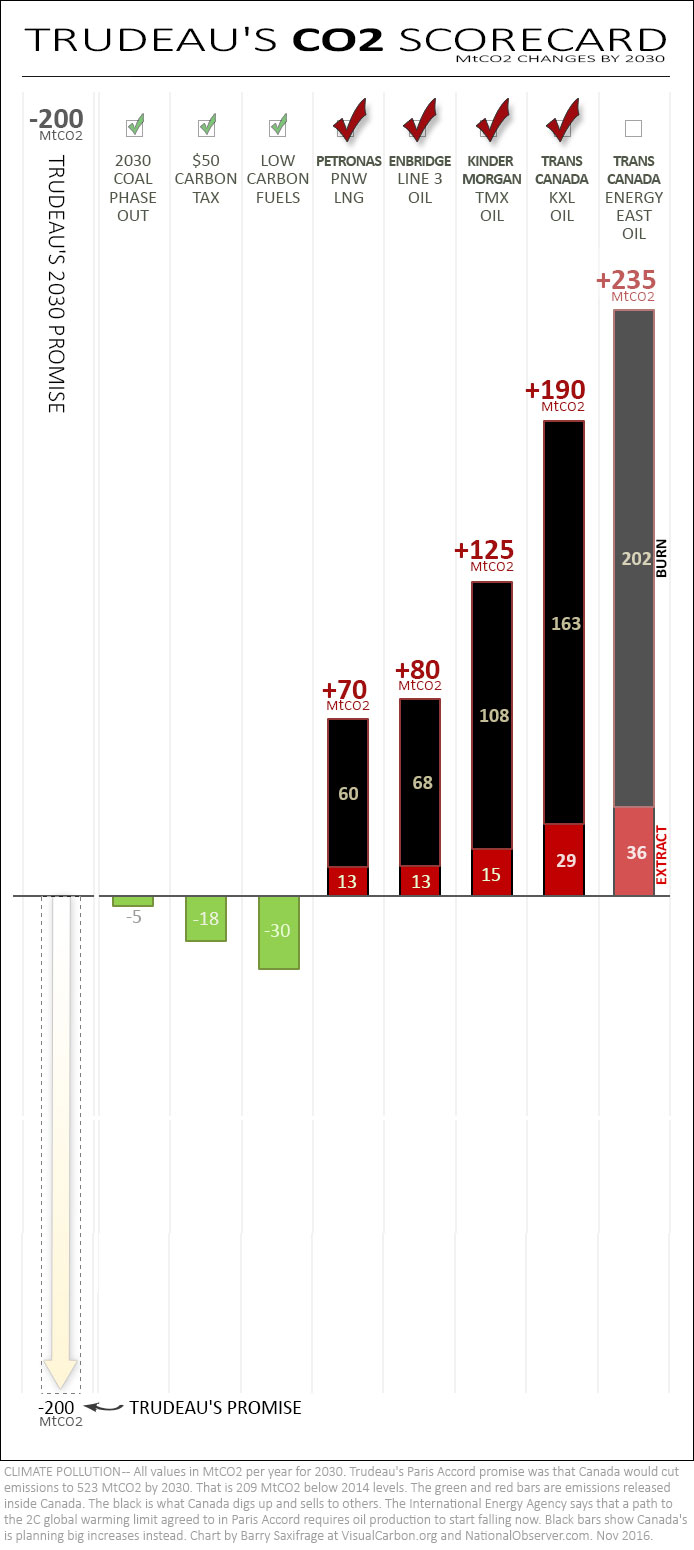
If you're wondering where we headed with all these contradictory climate actions, join the club. Trudeau's government could easily provide Canadians with a running climate pollution summary after each big decision. But they don't.
So, last week I tried to put the chaos into context with a "Trudeau CO2 Scorecard." Already it needs an update, so here it is.
This version includes both the Kinder Morgan and Enbridge approvals, as well as an announcement about a possible low-carbon fuels standard. The green and red bars are emissions released inside Canada. The black is what Canada digs up and sells to others.
You might have heard that Trudeau's pipeline approvals appear to have secured Alberta's support for his proposed $50 per tonne carbon price. That's the second column in the scorecard.
As you can see Prime Minister Trudeau's feel-good climate policies continue to be swamped by his simultaneous push for massive increases in Canadian carbon extraction.
Does this look like climate leadership to you?
-----------------
For those interested in the details on each column in the scorecard, I've updated those below as well.
What Trudeau promised
Trudeau has repeatedly promised that Canada will do its part to keep dangerous climate disruption to "well below" a two degree Celsius increase in global warming.
When signing the Paris Climate Accord, along with over 190 other nations, Trudeau committed Canada to a 30 per cent reduction in our climate pollution by 2030. That's 200 million tonnes of carbon dioxide (MtCO2) less than we emit now. My "CO2 Scorecard" chart shows this promised action in the first column.
More recently, the Trudeau government reported that the path to a 2 degree future requires an 80 per cent cut in Canadian climate pollution by 2050.
And the International Energy Agency has made it clear that humanity's path to that safe climate future requires oil production to start falling now. That's obviously not what Trudeau is planning to do.
Small-impact clean policies…
Since signing the Paris Climate Accord, Mr. Trudeau has announced three new climate policies. Collectively they are far too little to hold off the flood of climate pollution from surging fossil fuel extraction.
CLEAN POLICY #1: Coal-free by 2030.
It sounds impressive, but what little coal Canada burns was already being phased out under existing polices. Trudeau's new proposal just accelerates this a bit. As a result, it will only reduce our nation's climate pollution by 5 MtCO2 in 2030 compared to what was already planned. This reduction is illustrated in column two of my chart.
CLEAN POLICY #2: A $50 Carbon Tax.
This proposed carbon pricing policy also generated lots of favourable headlines. Unfortunately, as the third column shows, it delivers less than a tenth of the cuts needed for 2030. That's according to estimates by EnviroEconomics.
CLEAN POLICY #3: Low-carbon fuel standard.
Just before approving the Kinder Morgan and Enbridge expansions, the Trudeau government said they were considering a low-carbon fuel standard. They say it could possibly reduce emissions by 30 MtCO2 in 2030.
Massive dirty approvals.
BIG POLLUTER #1: Petronas PNW LNG.
Trudeau recently approved this gigantic liquid natural gas (LNG) proposal. The approval green lights an entirely new fossil fuel industry in Canada: LNG. Extracting and processing all the fracked gas will emit approximately 12 MtCO2 in British Columbia. This threatens to overwhelm B.C.'s entire legal, moral and ethical climate budget for 2050, which is just 13 MtCO2. British Columbia promised to cut emissions 80 per cent by 2050 – right in line with what the Trudeau government says we all must do. Yet Trudeau handed nearly all of these most critical emission rights in B.C. to a Malaysian state-owned corporation. What's everyone else supposed to do? The full lifecycle of all that LNG will exceed 70 MtCO2.
BIG POLLUTER #2: TransCanada Keystone XL.
Trudeau asked for it. He "steadfastly" supports it. US President-elect Donald Trump has promised "100 percent" to approve it. This mega-project will pump up to 190 MtCO2 in bitumen per year. That is more than the combined emissions of the 100 least climate polluting nations. Nearly 30 MtCO2 will be emitted in Alberta to extract the all the extra bitumen. As the scorecard chart makes clear, this alone will more than wipe out the climate savings from Trudeau's 2030 coal phase out and his $50 carbon tax.
BIG POLLUTER #3: Doubling Enbridge Line 3.
On top of that, Mr. Trudeau just approved Enbridge's Line 3 expansion. This mega-expansion would carry another 80 MtCO2 per year. Some 12 MtCO2 of that would be emitted in Alberta to extract the bitumen.
BIG POLLUTER #4: Tripling Kinder Morgan Trans Mountain (TMX).
Mr. Trudeau simultaneously approved a tripling of Kinder Morgan's Trans Mountain pipeline. This would pump an additional 125 MtCO2 worth of bitumen each year. Trudeau will still need to force it through bitterly opposed B.C. communities.
BIG POLLUTER #5: TransCanada Energy East.
The biggest pipeline of them all is working its way to Trudeau's desk. It alone would pump another 10 billion tonnes of climate pollution.
Running up the down escalator
Meanwhile, the International Energy Agency (IEA) calculates that fossil oil production must start falling if humanity wants to limit dangerous climate changes to less than two degrees Celsius in global warming. Clearly that's not what the Trudeau government plans to do.
Canada is already the world's fourth largest exporter of fossil oil. But apparently our 700 MtCO2 worth of fossil oil extraction each year still isn't enough. He's cheerleading and approving massive increases heading towards a billion tonnes of climate pollution per year and beyond. He has no plan to ever decrease what Canada pulls out of the ground.
Here's a chart comparing Canada's planned fossil oil expansion to the IEA 2°C Scenario.
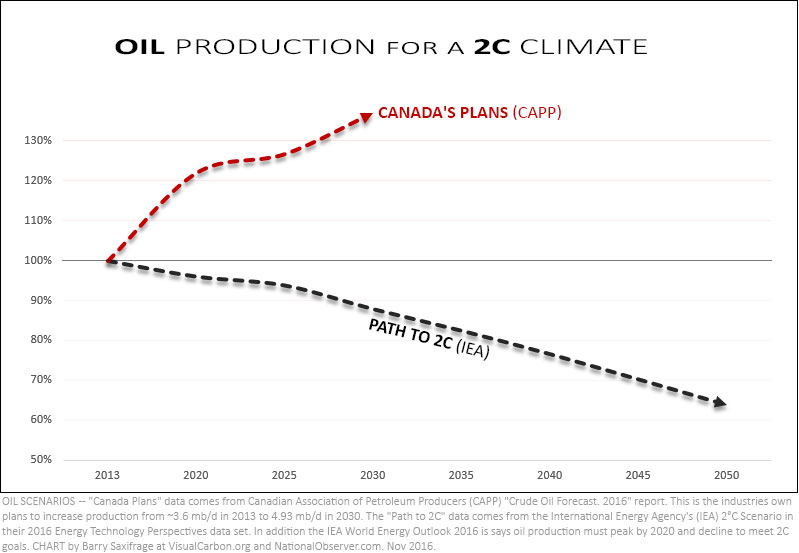
Canada has increased its emissions in each of the last five years. In fact our climate pollution has gotten so bad that we no longer bother talking about our upcoming 2020 international climate commitment. Remember that? The U.S. is on track to meet their identical 2020 commitment. Europe already has. But in Canada we gave up trying long ago.
Our previous Prime Minister, Stephen Harper, promised he had a plan to meet our 2020 climate commitment. But his under-weight climate policies got wiped out by his higher-priority push to keep expanding Canada's carbon-extraction industries.
Now our new Prime Minister has picked up Harper's shovel and seems to be digging us into an ever deeper climate hole.
------ Notes on the climate pollution math --------
PETRONAS PNW LNG – The federal government's "Draft Environmental Assessment Report" for this project states that BC emissions from it are projected to range from 11 to 13 MtCO2 per year through 2050 and beyond. The report also states that these levels are "high in magnitude, continuous, irreversible and global in extent ... likely to cause significant adverse environmental effects." That is just to extract and process the LNG. Burning it will release another 60 MtCO2. BC's legislated 2050 climate target is 13 MtCO2.
PROPOSED OIL PIPELINES -- Environment Canada estimates 90 kgCO2 is emitted to extract each barrel of bitumen. A study by Oil Change International estimates 520 kgCO2 is released when each barrel of bitumen is burned. That's approximately 600 kgCO2/bbl in total. Here is a list of the biggest of the proposed pipelines with capacities & lifecycle CO2 from the oil based on 600 kgCO2/barrel:
- TransCanada Keystone XL: 890 thousand barrels a day (kb/d). 324 million barrels per year (mb/y). 195 MtCO2 per year from oil.
- Enbridge Line 3 Expansion: an additional 370 kb/d. 135 mb/y. 81 MtCO2/year
- Kinder Morgan Trans Mountain Expansion (TMX): an additional 590 kb/d. 215 mb/y. 129 MtCO2/year.
- TransCanada Energy East: 1,100 kb/d. 402 mb/y. 241 MtCO2/year.
FULL SIZE VERSION -- Here's a full size version of the CO2 Scorecard.
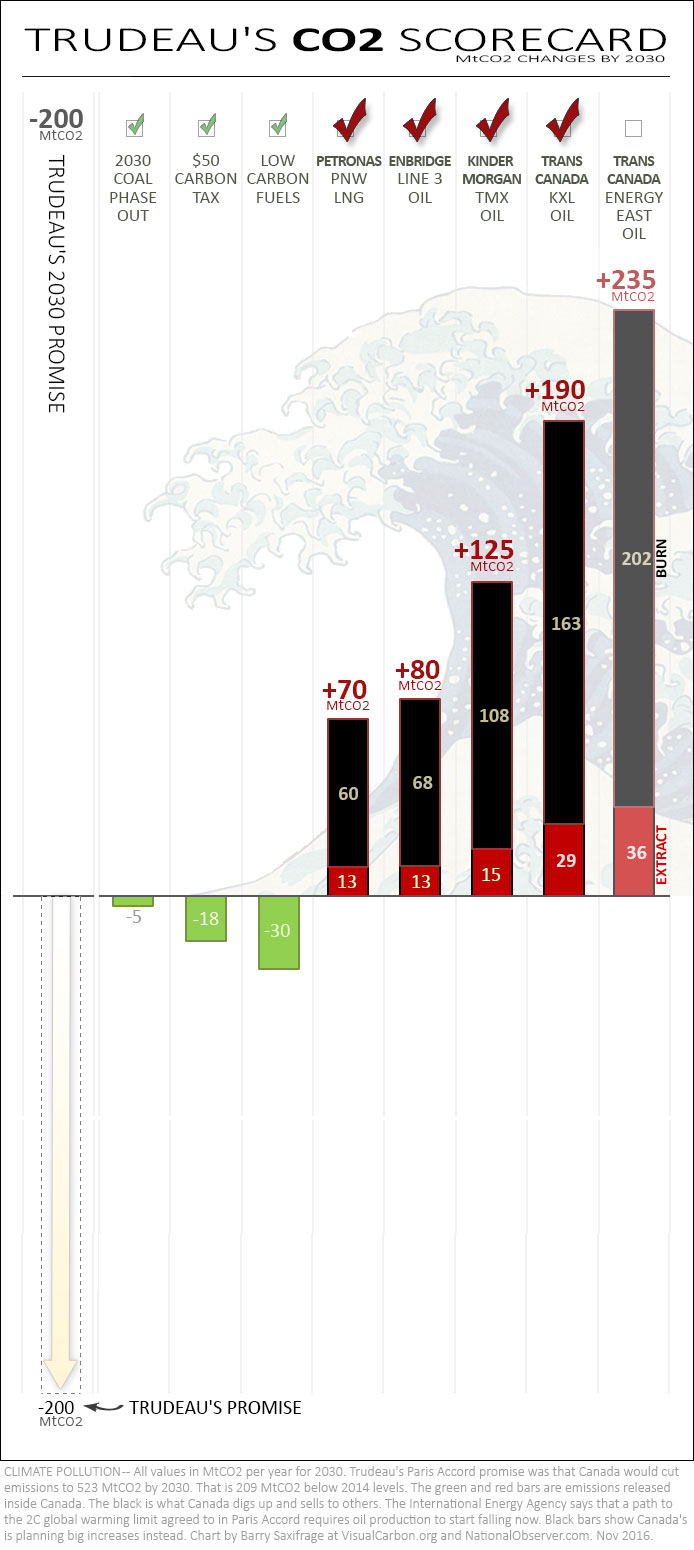



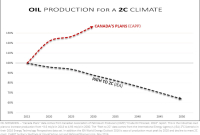
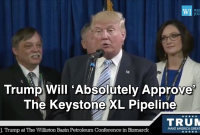
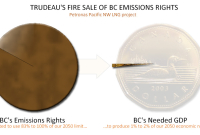
Comments
This media resource is a blessing! Thank you for all the great 'digging around' that you do. I would love to see an opinion piece on the question that so many of us are asking, which is: "What are these people (the PM and his Ministers) THINKING???" Do they not have children? grandchildren?
Excellent analysis Barry!
Nice summary and visual. But what about methane? It is significant.